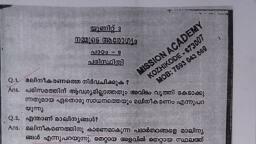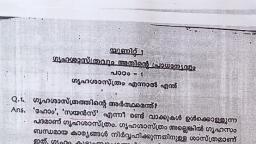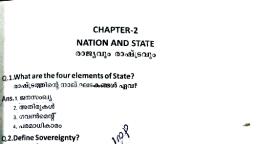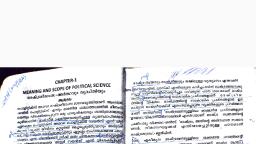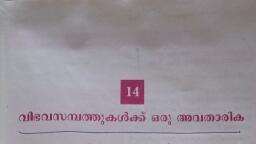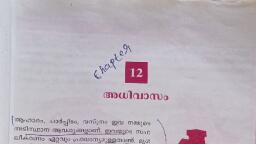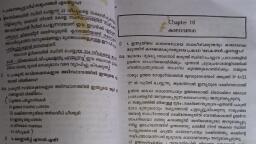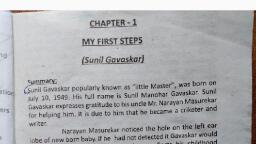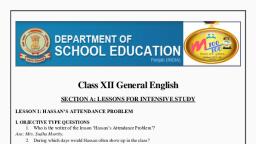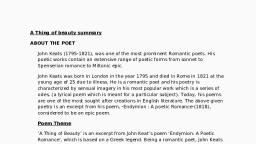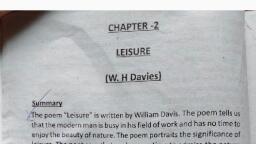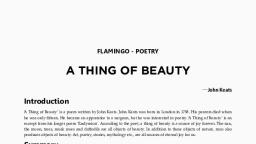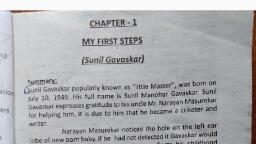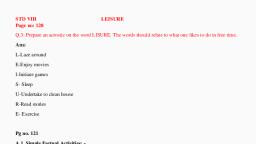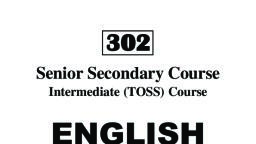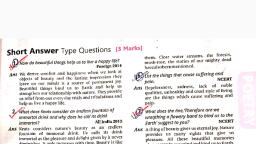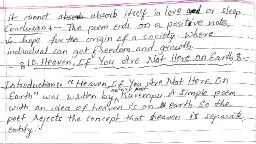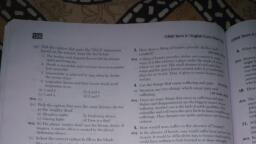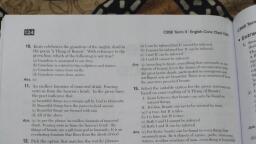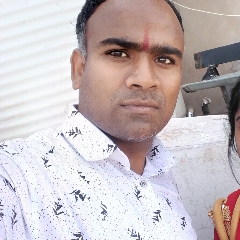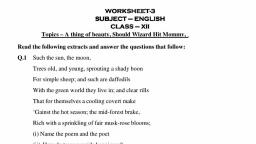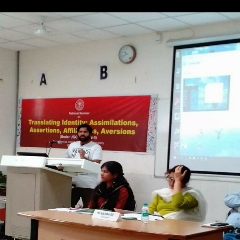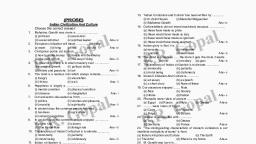Page 1 :
CHAPTER -2, LEISURE, (W. H Davies), Summary, The poem "Leisure" is written by William Davis. The poem tells us, that the modern man is busy in his field of work and has no time to, enjoy the beauty of nature. The poem portraits the significance of, leisure. The poet says that we have no time to admire the nature, around us. Even we can't spare a few moments to stand under the, branches of trees and enjoy the beautiful and restful shades of the, tree. Animals like sheep and cows are better than us in enjoying, life. We cannot look at them grazing in the field and the beauty of it, when we pass through some forests. We do not have time to stop, for some moments to look at the trees tall and short and enjoy, their natural beauty, and also we cannot look at the small animals, like squirrels concealing their food grain in the grass for the winter., The natural beauty is scattered all around us. Here, natural beauty is personified as a young beautiful dancing... girl, having a smiling face. But we have no time to stand at a place and, look carefully. at nature that can refresh us. As human being, we, should spare some moments; look at nature, natural beauty and, enjoy life., mlo oo), 63 0), 18
Page 2 :
Shades, Ans., Grazing, Q.5, munelo, Pasture, Ans., Revealing, Q. 6,, Concealing, Ans., Scattered, almlajlmolm, personified, Read the stanza carefully and answer the following questions:, *stanza 1: What is this life if full of care., We have no time to stand and stare?, No time to stand beneath the boughs., Q.1, And stare as long as sheep or cows., Questions and answers, An, Q.1. What do you understand by the word 'care' in the first line?, Ans. The word 'care' means worries and problems of life (free from, anxieties )., Q.2. what does the poet mean by the phrase 'stand and stare'? Pick, out the correct answer from the three alternatives given, Q., below: it means., An, a. Looking at things unblinkingly, b. Looking at the beauties of nature and enjoying them, c. Lost in thought looking at nothing., Ans h itmeans looking at the beauties of nature and enjoy them., 0.3. what is it that sheep and cows do for which we have no time?, Ans sheep and cows have time to stand and stare but we human's, don't have time to see the beauty of it., Q.4. Who is the poet of this poem?, 20
Page 3 :
Ans. W. H. Davies is the poet., Ans. 'We' is referred to human beings., Q.5, Who is 'we'in second line?, 0.6. What complaints are made by the poet?, Ans. The Poet is, spending. We don't have time to see the natural beauties of the, upset that are always busy in earning and, world, Stanza2: No time to see when woods pass., WHere squirrels hide their nuts in grass., No time to turn at Beauty's glance., And watch her feet, how they can dance., Q.1. what does the poet think we need time for in, Lines 5 to 6 and Lines 7 to 8, Ans. Lines 5 to 6 to see the squirrel hide their nut's in the grass., Lines 7 to 8 to turn at beauty's glance and watch her dancing feet., Q.2. In the seventh line the poet spells the word 'Beauty' with a, capital letter 'B'., "No time to turn at Beauty's glance'. Does it refer to beautiful, girl or to the beauties of nature or to both., Ans. In the seventh line, W. H Davis spells the word beauty with, capital letter because it refers to the beauty of both nature and a, beautiful girl., Q.3. How do the beauties dance? (personification in this poem), leap up, bees dance, birds fly., Ans. 1. the tall tress stand tall with their heads high, SE, 21
Page 4 :
2. mountains speaking to the sky., *stanza 3: No time to wait till her mouth can., Q.7. Wh., Enrich that smile her eyes began., Ans. Th, worn, A poor life this if, full of care, we have no time to stand and stare., Q.1. Who is "her" in line no. 9?, Ans. The beauty is "her" in the line no.9, Q.2. The line "till her mouth can enrich that smile her eyes begar, means that Tick mark (v) the correct answer., 1. a rich woman smiles with her eyes, 2. eyes and mouth smile together, 3. beauty's smile begins from the eyes and spreads to her lips., Ans. (3), Q.3, What according to the poet is a poor life ?, Ans. According to W. H Davis a poor life, is a life, which is so full d, worries that we have no time to relax and enjoy the beauties of, nature., Q.4. Who is "we" in the poem?, Ans. "We" refers to the human beings who have no time, 0.5. Which word have been repeated six times in the poem? Why?, Ans "No time" the phrase 'no time' is repeated to emphasize the idea., does, their life movements., Q.6. Some of the words that rhyme in the poem are., Care, stare, ------- COW, Ans. pass - grass, glance-dance, can-began., 22
Page 5 :
23, s The poet says that nature has soothing effect against all the, Personification, Attributing human qualities to inanimate objects, Eg: Gentle touch of wind, Moon played hide and seek with clouds, In the above examples touch, play are actions that can be, done by humans. But these capacities are attributed to, non-living objects., Rhyming Words, Two or more words that end in same sound (need not be, same spelling) are called rhyming words, Eg: paşs- grass, glance- dance, can- began, bough-cow, PYQ, pya Towhat affi Gede of People Gocwarets natre, does the Poeb Linf ? dmaHl ocG do14 a, Ice n, 2 what lcind of life do eg the Poeb noG lind ? Jmark, APzill -201l
